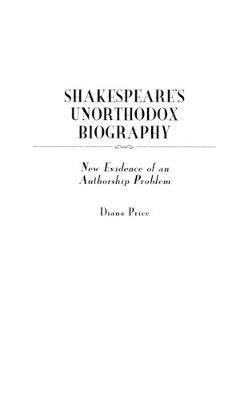Reviewed by brokentune on
This book poses a bit of a conundrum for me: Is it possible to like a work of non-fiction and enjoy reading it, while at the same time taking issue with - even vehemently disagreeing with - the content of the book?
In Shakespeare's Unorthodox Biography: New Evidence of an Authorship Problem, Diana Price explores the reasons why Anti-Stratfordians believe that the author most of us know as William Shakespeare was not the one man from Stratford that has been credited with the creation of Shakespeare's works.
Price goes through the arguments of why Shakespeare wasn't Shakespeare one by one and creates a well-rounded overview of the Anti-Stratfordian tenets. She starts with differences of names in records, mentions of Shakespeare in the writing of his contemporaries, financial records, biographical dates, and the works themselves, dissecting the use of language, rhythm etc. for clues of authorship.
I am certainly no Shakespeare scholar, I have merely a passing interest, but overall I found the arguments really unconvincing, especially the ones based on financial records.
One one hand, Price argues that there are hardly any records to show that Shakespeare, the Stratford man, received any payment for literary work, which Price uses as evidence that the man in Stratford didn't write the plays (etc.). On the other hand, Price argues that there are few records of any payment for the literary works created by anyone. There seem to be records for payments from various patrons to the actors and theatrical groups, but there seems little differentiation between actors and writers.
Is this really all that surprising? At a time where printing had developed into an industry based on the sale of tangible goods but publishing had yet to establish itself because professional authorship as such was still in its infancy, why would we expect to see records of payments to authors? If printing produced tangible goods for sale (no advertising as yet) with no consideration given to authors, why would we expect theatrical players who had an even longer history of producing any known story with appeal to the crowds to make the distinction between writers and players?
Copyright was not introduced to the UK until 1710, so why would there be a need for recording a distinction of works, and for recording payment (as proof of payment)?
I don't get it.
What I also didn't get was the argument that the Shakepeare the London playwright would not have needed to become a landowner and business man in Stratford becasue surely his literary success would have secured him an income.
Literary success or success as an actor/producer/theatre owner was a risky and more so fleeting business. My question back to the author would really be why wouldn't a man supporting a growing family try to secure an income from a traditional source such as land and tenancies?
I really don't get the basis for most of the arguments in the book, actually, even if I'm only mentioning two here.
So why did I still enjoy reading this?
I think the answer is because the book did make me look at how we look at biographies, research, and the presentation of arguments. I liked that the author tried to go into quite a lot of detail of looking at records and questioning how we read biographies and how some biography writers forego original research and simply re-work secondary sources, sometimes without fact-checking, which can lead to contradictory statements of fact.
This is something I have come across in biographical work of other authors and other people on several occasions and it is a particular pet peeve of mine.
However, while I share Price's annoyance with lazy research and I liked her questioning the "facts" presented by several biographers, I had little time for her reasoning and production of evidence for any counter-theories.
Next up, I'll turn to Stanley Wells' short work on Why Shakespeare was Shakespeare for a - no doubt passionate - defense of the traditional view of Shakespearean biography.
Reading updates
- Started reading
- 17 June, 2019: Finished reading
- 17 June, 2019: Reviewed
- Started reading
- Finished reading
- 17 June, 2019: Reviewed
